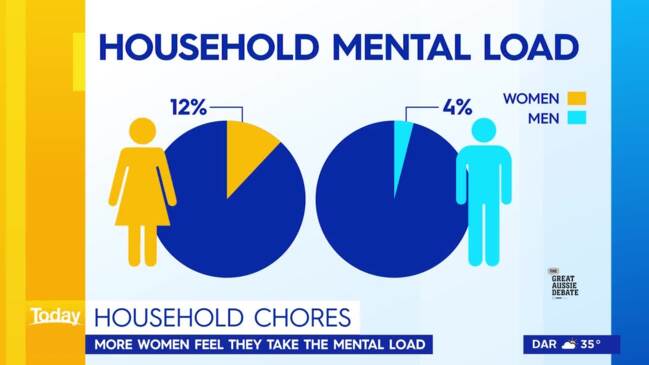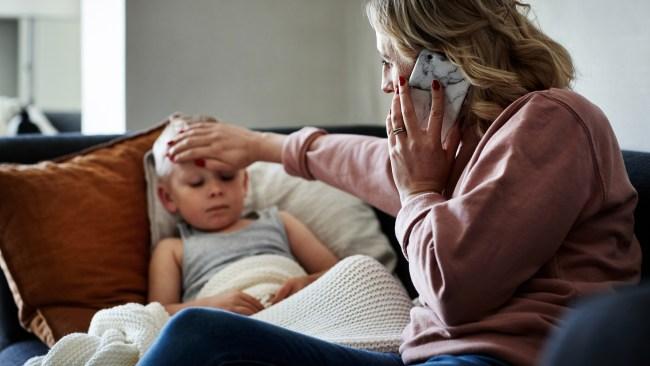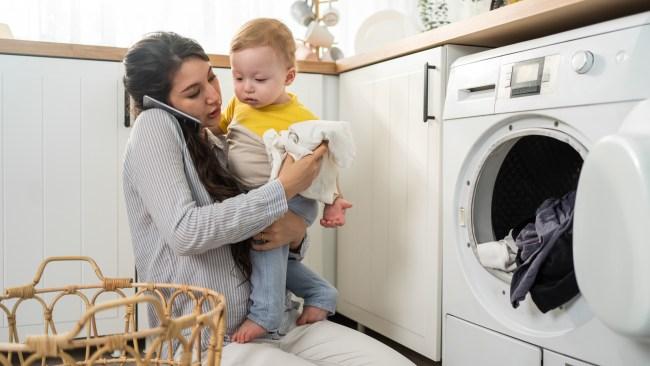When it comes to households, women are still saddled with the 'mental load'
"Are we out of milk? Did I remember to book in the kids' flu shots? I need to respond to that daycare email tonight..." Even when chores are divided equally between partners, the invisible workload is impossible to measure.

Parenting
Don't miss out on the headlines from Parenting. Followed categories will be added to My News.
It comes as no surprise to many that women carry the entire mental load of their households.
News Corp’s recent Great Debate survey found that 12% of females carry the mental load of the household, conversely only 4% of males carry the load. While in most households, chores are divided fairly equally between partners, the mental load falls mostly on the woman.
It’s very clear women are the CEO & COO of the household
Even among couples who believe that they have achieved an equal division of labour, the more hidden forms of care generally end up falling to the woman. The survey found, 35% of female respondents and 44% of male respondents agree to chores evenly split in their household.
Want to join the family? Sign up to our Kidspot newsletter for more stories like this.

RELATED: 5 ways to get through end of term mum burnout
This never ending to-do list can include (but is not limited to):
- Organising playdates and birthday parties
- Booking the kids’ medical check-ups
- Figuring out how to hide vegetables in their meals
- Ensuring there’s enough food on the shopping list
- Worrying about whether your kid is on track at school
- Your child needs new shoes
- When to replace your washing machine
- Making sure the fridge and pantry are stocked - and with the right stuff
- Keeping up with school/daycare emails
- What day is sport/non-uniform days
- Lunch boxes, school assignments, after-school activities
- Scheduling service providers and bill payments
- Organising family vacations
- The Christmas gift list for the entire extended family
And it goes on…
Invisible, unlimited work
With every task it’s like opening another tab in your browser, but never being able to close it. On their own, these may all seem like small chores – but they mount up. Not to mention, these tasks are often for the greater good of the family, not the mother herself.
This hidden work is hard to measure, because it’s invisible and performed internally, making it difficult to know where it begins and ends.

RELATED: Mum turns mental load into a successful wall planning business
Ways the mental load impacts parents' health
- Anxiety and depression
- Sleep deprivation
- Memory gaps
- Headaches
- In some cases, substance misuse
This hidden work has various impacts; we know, for instance, that women are more likely than men to worry about their child in care even when they are not with them. It also causes additional stress, because it is always present – even when you need to be concentrating on other things.
The impact of the mental load can lead to burnout, health issues and a serious lack of sleep.
It comes as no surprise that through constant juggling, mothers aren’t getting nearly enough sleep. From the responses to the survey, 28% of females didn’t have a single night with uninterrupted sleep (in the previous 7 days).
RELATED: 'The key to the mental load is communication'
Ways to ease mental load
- Set boundaries
- Delegate (before it needs to be done, not when it needs to be done)
- Make time for yourself
- Get outside help when needed
While an equal distribution of chores is a great step forward, there needs to be an equal division of the mental load to avoid resentment and exhaustion from one partner.
More Coverage
Originally published as When it comes to households, women are still saddled with the 'mental load'




